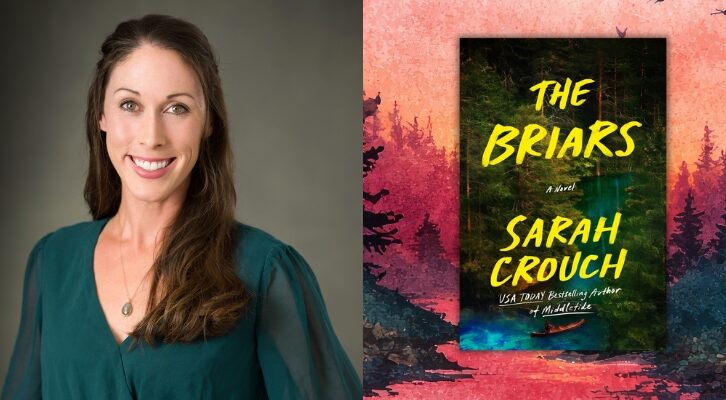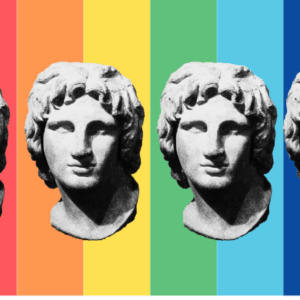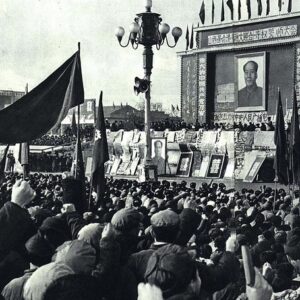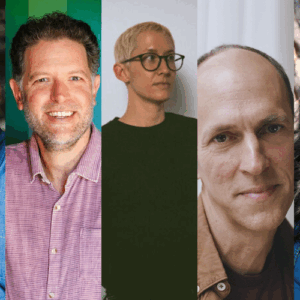
It's Past Time for the Bookselling Industry to Reckon with Its Institutional Racism
Angela Maria Spring on "Both-Siderism" and the Whiteness
of Bookstore Ownership
Four years ago, in July of the 2016 presidential election season, I gave my notice at a major independent bookstore where I was a manager, because the store’s owner would not say “Black Lives Matter.”
It was a brutal summer for many reasons beyond the stifling humidity of Washington, DC, which swallowed me whole no matter how many years since I had left New Mexico’s high desert for the East Coast. It was a summer when the televisions in every bar where I sought refuge showed then-candidate Donald Trump’s racist words scrolling unqualified in the ticker lines of broadcast news stations. A summer when I stared at Trump’s grinning grimace on multiple books on our Non-Fiction display wall, located directly across the desk where I worked ten-hour shifts with a brilliant team of booksellers, many of whom were also people of color.
It was the summer when Micah Xavier Johnson shot into a crowd of Dallas police during a Black Lives Matter protest, igniting an already smoldering white nationalist fury. A summer when Michael Eric Dyson, one of our customers, wrote in the New York Times, “In the wake of these deaths and the protests surrounding them, you, white America, say that Black folks kill each other every day without a mumbling word while we thunderously protest a few cops, usually but not always white, who shoot to death black people who you deem to be mostly ‘thugs.’”
I oversaw our all floor displays, and though one of the store’s owners had recently devastated me by casually remarking that the voices of minorities had already been heard from enough, I asked to reinstate our Black Lives Matter display, with Dyson’s words as the centerpiece.
Instead, the owners opted for a sign that read “Violence and the Racial Divide.” Though it was merely the latest slap in the face over the many years I worked in bookstores, this time a fury consumed me whole. It was the final nail in the coffin of my then-16-year career working as a bookseller in white-owned stores.
As bookstores across the country field an unprecedented number of orders for anti-racism books, it’s time for the bookstore industry to face its own reckoning with white supremacy.
I am the white-passing, white-privileged Latinx daughter of an immigrant, with family from Panama and Puerto Rico, and a white father who did nothing but visit a lifetime of violent rejection upon his unwanted brown children. As such, I have never been blind to the deep racial inequalities this country was built upon, but my privilege has allowed me to exist in a state where I believed our institutions were capable of change.
My first sundering with this fallacy was when I left my job to start my own business with no money, no investors, and over $70,000 in student loan debt. My only certainty was that my store would be a space by and for BIPOC, where we are celebrated and centered. Where we would occupy the high-level positions denied to us at so many bookstores around the country.
My last day at my previous bookstore was October 31. I toasted my colleagues at our regular post-shift haunt and two days later, I was on the train to join my husband, a political campaign specialist, in New Hampshire to knock doors for the Democratic Party. We won the state by the barest of margins as I sat alone in a kind stranger’s house watching the returns, drinking glass after glass of wine and crying, feeling utterly naive that I expected any outcome other than Donald Trump’s election.
Two months later, in Minneapolis, during 2017’s Winter Institute conference, hosted by the American Booksellers Association, I gathered my courage and, with my good friend, Hannah Oliver Depp—now the owner of Loyalty Bookstores—delivered a prepared statement to the ABA board at our Town Hall. We called for substantive change within the organization, including championing Black and POC booksellers, and making the board and organization more inclusive. Other Black and POC booksellers spoke out to the same effect. The result of that meeting was the creation of the Diversity Task Force, dedicated diverse seats added to the Booksellers Advisory Council, and my own eventual election to the ABA board.
It’s now clear that these menial efforts have fallen so short it’s almost as if they never happened. No single thing created systemic inequality and no single effort will end it. As bookstores across the country field an unprecedented number of orders for anti-racism books, a desperately needed shot-in-the-arm for so many of us who have struggled during the pandemic, it’s time for the bookstore industry to face its own reckoning with white supremacy.
On June 6, Len Vlahos and Kristen Gilligan, the owners of Tattered Cover, Denver’s largest independent bookstore chain, published a statement to explain their silence as the Black Lives Matter movement had engulfed the nation. Their tepid explanation drew outrage and condemnation in Colorado and across the nation.
Though they have since apologized, their original statement is rife with “both-siderism,” a gaslighting technique used frequently in journalism, where “every” side is presented in the exact same manner, with no qualification on the part of the reporter. There is evidence that alt-right extremists have used the both-siderism of the mainstream media to launder their white supremacist views and to give their ideology a patina of credibility. And it is a technique used by bookstore owners to uphold a paternalistic, and—at its heart—racist intellectual superiority.
The bookstore industry has embraced a fanatical championing of free speech, which keeps their spaces unsafe for the Black community and other communities of color, and prevents stores from creating more inclusive working spaces for non-white booksellers.
Before we buy the book from the publishers or wholesalers to put on our shelves, we are not beholden to the First Amendment.
Vlahos and Gilligan wrote in their statement: “Our value to the community is to provide a place where access to ideas, and the free exchange of ideas, can happen in an uninhibited way. It’s not for us to determine which ideas in the pages of our shelves are valid and which are not. We leave that to you, our readers.” This claim absolves them of responsibility for what books they keep in stock, what events they host, and who they hire.
This is a common technique used by white owners to silence both their own Black and POC employees and the wider Black and POC communities at large. When we, BIPOC booksellers, say we feel unsafe in these spaces due to inviting, for example, Ted Nugent, a known white supremacist, for an event, as referenced in the Tattered Cover statement, we are told that it’s important for all voices to be heard. When bookstores champion “the free exchange of ideas” and let “the readers” decide what books are valuable, they uphold systemic racism.
The narrative that bookstores are community centers akin to libraries is one that helped the industry weather the storm of Amazon’s ascent in the early 2000s when bookstores were closing in droves. Instead of examining bookstores’ unsustainable business models or how outside factors such as gentrification affected rent prices in a low-profit retail industry, we clawed our way back in part by reconnecting with our communities, championing the Shop Local movement, and killing the “judgmental” bookseller cliché.
And suddenly, the First Amendment became a rallying cry. But the idea that it’s important for bookstores to carry Mein Kampf, or anything by Sean Hannity, is built on a false premise.
Bookstores are not libraries, and very few are non-profits. Bookstores are businesses, and their narratives are based around the fact that their owners are expert curators, that every book on our shelves is lovingly and intentionally selected for our wonderful customers and readers. And we will happily put those books in your hands if you ask us, endorsing them with our whole hearts.
Every time a fellow white bookstore owner touts the importance of, say, carrying Hannity’s books, what I hear is that they deliberately purchased that book to put on their shelf and into their customers’ hands and are perfectly happy making money from and for Hannity. Because before we buy the book from the publishers or wholesalers to put on our shelves, we are not beholden to the First Amendment.
My bookstore does not carry books by white authors. That is not censorship—it’s curation. If someone asks me to special order a book by a white author, I’m happy to do so. But since my store opened, I have yet to have anyone be upset that I only carry books by BIPOC authors because that is my intended purpose—to create literary spaces by and for people of color, where anyone is welcome to shop, but that centers us, POC booksellers, authors, and our communities.
I also publicly declared I was not carrying books by Sherman Alexie when he was exposed as a toxic sexual predator because my store is a safe space for women, especially women of color, and I categorically refuse to make money from anyone who abuses women. No one seemed to mind, but if someone did, they would be free to spend their money elsewhere.
White bookstore owners cannot insist they want to hire more Black and POC booksellers and make their stores more inclusive, or try to gain more Black and POC customers, if they cling to their free-speech both-siderism. The two are mutually incompatible.
It is only now, in the wake of continuing protests as the Black community fights for its right to live, that anti-racism has become a topic of conversation across the book industry. BIPOC representatives on boards in the industry, who spent years fighting to make a difference, now find ourselves in the exhausting position of explaining to white members how BIPOC have been systematically kept out of bookstores, out of publishing, out of awards, out of book reviews.
Bookstores do not have official industry demographic numbers for BIPOC-owned bookstores or booksellers—a damning omission. I strongly suspect that the numbers are on par with publishing’s, as the book industry is an ecosystem, and often an echo chamber, for the life of a book.
A Lee & Low survey, “Black Representation in the Publishing Industry,” finds Black representation at 5% or less across all categories, including authors, marketing, sales, reviewers, and an abysmal 1% in editorial. While I haven’t seen numbers on Black bookstore ownership, I do know that what was once a larger industry dwindled after the J. Edgar Hoover-led FBI went after them in 1968.
However, that’s hardly the entire story.
Black and other POC communities are often unable to access traditional forms of capital to start businesses. For example, if we don’t own a house we can borrow against or we don’t have a significant savings from a previous career, the banking system is built to reject us. It’s only in the past decade that many of us have been able to crowdfund, or apply for government grants, to open our businesses. And it is still Black and POC businesses that remain the most vulnerable to closing during this pandemic, just as our communities are the most vulnerable to the pandemic itself.
Though my bookstore, Duende District, continues to thrive, I’ve watched at least three vibrant Black Latinx and Latinx-owned businesses that have hosted Duende pop-ups since 2017, including my beloved partner, Dio Wine Bar, close their doors.
The overwhelming support of Black and POC bookstores that has emerged in recent weeks is both shocking and amazing, but its sustainability remains a question. So many unknowns are before us. But the systemic inequality in this country was built into its bones, largely to keep Black people from owning anything, allowing them only to only be owned. This systematic inequality, of the white-owned bookstores and all their operating principles are a part, help keep Black and brown bookstores from opening or from staying open.
One of those financial systemic inequalities stems from another type of literary entrepreneur (private and non-profit) I’ve dubbed the “White Savior Bookseller.” They are often, though not always, white women who build stores or non-profits in Black, Latinx and POC communities with little to no “traditional” access to books and authors. While on the surface they seem extremely well-intentioned, and some genuinely are, they come into outside communities with the conversation centered on themselves instead of using their privilege, financial and otherwise, to help support BIPOC within the community create those spaces themselves.
In the first year of building Duende District, I was contacted by the wonderful staff of an arts center in Anacostia, a mostly Black community in DC, and at the time a “book desert,” about possibly building a bookstore within the center. While I loved the center’s staff and their vision, I declined. It didn’t feel right for me, a non-Black Latinx with no roots in the neighborhood, to be the face of the project.
A few months later, the director invited me to a meeting with a couple other people who were interested in working together as a sort of co-op owner model. This is where I met Derrick Young, owner of the then-online bookstore, MahoganyBooks. Derrick and his wife and co-owner Ramunda are long-time booksellers, and brilliant entrepreneurs. We loved each other’s business models, so we worked together with the Anacostia Arts Center to get a DC Great Streets Grant, which generated enough additional seed money to open the Youngs’ store. Duende District operated as a long-term pop-up for the first year of MahoganyBooks’ operations and I also ran the floor twice a week. It was one of the most important learning experiences of my career: by de-centering Duende, while staying true to our mission, Anacostia got a bookstore that was the right fit, by and for their Black community.
When white-run businesses come into our communities to tell us what we need and what they’re willing to bring us, in terms of books and authors, I am always leery. There are ways to be true allies, to open up doors so many of us do not have access to, but it’s not possible when the so-called allies are organizations built on the labor of Black people and POC, with the white owner taking all the plaudits and accolades. That kind of “help” is a type of vulturism and an insidious arm of white supremacy in bookselling.
It is far too easy to be a performative ally, and in the past four years, many booksellers have taken the easy road. I hope every non-Black-owned bookstore owner is also reading the same books that are currently bringing in desperately needed income. The Black Lives Matter civil rights movement, ongoing for years, has laid bare the gaping, bloody wound of US racist capitalism and bookstores are not exempt. If white bookstore owners want to be real allies for their communities and for whatever BIPOC employees they have, they’ll need to come to terms with their active participation in creating racist spaces, and dismantle the white supremacy they have continued to uphold.
It’s possible the bookstore industry might, finally, be ready to begin this process of dismantling its institutional racism and work toward creating a new narrative for the future. While I continue, perhaps foolishly, to hope for this, I will also continue to dedicate myself to creating literary spaces where my people don’t have to rely on those who have always left us behind.
Angela Maria Spring
Angela Maria Spring is the owner of Duende District, a mobile boutique bookstore by and for people of color. She holds an MFA from Sarah Lawrence College and you can find her recent poems in Rust + Moth, Radar Poetry, Glass: A Journal of Poetry, and forthcoming in Borderlands: Texas Poetry Review and Pilgrimage. Her essays and reviews are at Catapult and Tor.com. Follow her online at Twitter at @BurquenaBoricua.



















